Because it took me years to master all of the blogging terms out there, I’ve compiled this ultimate glossary of key terms you’ll want to know to become a more successful blogger this year.
Recent blogging statistics highlight that there will be more than 32 million bloggers as we head into 2024 (in the US alone). Even more mind-boggling is that these bloggers are responsible for publishing nearly 70 million blog posts every month. Blogging has a rich history, and it’s not going anywhere. In fact, it’s only getting more competitive.
Seeing that you’re competing with personal bloggers, affiliate marketers, professional bloggers, media bloggers, microbloggers, and reverse bloggers (you might want to look that one up in this list of blogging terms below), you’ll need all the help you can get.
231 Blogging Terms You Need to Know in 2024 (Blogging Glossary)
Disclosure: Please note that some of the links below are affiliate links, and at no additional cost to you, I’ll earn a commission. Know that I only recommend products and services I’ve personally used and stand behind. When you use one of my affiliate links, the company compensates me, which helps me run this blog and keep all of my in-depth content free of charge for readers (like you).
Since 71% of WordPress blogs are written in English, with Spanish at 4.7% (2nd) and Indonesian at 2.4% (3rd), we’ll be sticking to blogging terms in English for now. If you have some blogging terms to share that I may have missed in this glossary, please share them with us in the comments below!
Once you’ve developed a command of the blogging terms, you’ll need to know and be ready to build a profitable blog. Head over to my ultimate guide to starting a blog.
Want to Start Your Blog (the Right Way)?
Check out my ultimate guide How to Start a Blog (on the Side).
Now, without further delay, let’s dive into my ultimate list of all the top blogging terms you’ll need to know to blog smarter this year.
We’ll be going through this list of blogging terms alphabetically, so you can always jump straight down to the letter you’re searching for.
A — Blogging Terms
First up, key blogging terms that begin with the letter A.
1. AdSense
Google ads can run on your blog and turn your blog into a money-making machine. The program (Google AdSense) has been designed for bloggers and website publishers who are looking for opportunities to display targeted text, image, or video ads on their web pages—to earn money when a visitor clicks on those ads. Advertisers pay Google either by the click (PPC) or impression (CPM), and Google shares a percentage of that revenue with the AdSense publishers.

The image above shows an AdSense ad. You can get started installing AdSense on your blog right here.
2. A/B Testing
Testing of two versions of the content you create to find the perfect match for specific audiences. A/B testing for bloggers is most often applied to testing out different email subject lines within an email marketing tool like ConvertKit or AWeber or when sampling which blog post headlines perform better in terms of getting more clicks from organic search traffic.
3. Above-the-Fold
The content of a blog or webpage appears at the top before you need to scroll down.
4. Affiliate
An affiliate is a blogger who uses affiliate marketing or is in a referral program or revenue-sharing program that compensates you in return for recommending a product, service, or tool to your readers. Affiliate marketers earn commissions by promoting the products of others on their blogs (via affiliate programs). Learn more about affiliate marketing in my ultimate guide about how to make money blogging.
5. Autocasting
An automated form of podcasting that allows bloggers to generate audio versions of their text blog posts directly from their RSS feeds. You’ll still need to start a podcast first, though, which includes finding the right podcast hosting platform to get your show online.
6. Audioblog
A blog where the posts consist mainly of voice recordings or audio clips.
7. Avatar
A graphic picture or thumbnail image used to represent a blogger online. Here’s my avatar that appears at the bottom of each post on my blog:

8. Atom
An automatic feed format that’s sometimes used as an alternative to RSS feeds.
9. Analytics
The information and data that’s gathered to evaluate the performance of your blog and better understand who your readers are, what they’re doing, and how you can better serve them. The leader in website analytics (Google Marketing Platform) is powered by data from Google Analytics, which allows bloggers to measure how much traffic their blog is getting and where those readers are coming from, along with other essentials like your advertising ROI from any Google ad spend.
10. Anonoblog
A blog that an anonymous author maintains. Also known as faux or ghost blog.
11. Alexa Rank
The Alexa Rank measures a website’s popularity on the Internet. The rank is calculated with the help of a proprietary methodology that combines a blog’s estimated traffic and visitor engagement for the past three months. Alexa refers to the data retrieved from multiple browsers as its “Global Traffic Panel” and corrects biases with the help of an algorithm to get to an accurate Alexa Rank. Unlike other scoring systems, having a lower Alexa Rank is better, as it indicates your overall rank amongst the world’s websites.

12. Anchor Text
The text that’s used within a clickable hyperlink. For example, the anchor text of this hyperlink, how to name a blog, is “How to name a blog.”
13. Alt Text
Alt text, or alternative text, is the word or phrase that’s used to tell readers (and more importantly, search engines) of a blog the nature of an image on the page.

14. Astroturfing (in SEO)
The act of deceptively paying people to act like your customers (or an unbiased party) to promote your brand or blog to others. Yeah, it’s not a smart thing to do.
15. Automate
The process of automating a task online so that it’s controlled by a machine or WordPress plugin rather than a manual task done by a person.
B — Blogging Terms
Now, onto blogging terms that start with the letter B.
16. Biblioblogosphere
A humorous reference that is given to the niche is librarian blogging.
17. Blaudience
A blog’s audience—regular readers of a blog.
18. Blath
A mashup of the words “blog” and “math” describes math-related blogs.
19. Blawg
A blog focusing on law is usually written by a lawyer (hopefully), professor, or law student.
20. Bleg
A combination of the words “blog” and “beg.” A blog that requests contributions or information from their readers.
21. B-listless (Blistless)
When a blogger becomes apathetic towards their new content. It indicates what could happen to the email list of a blogger that loses interest.
22. BBloggers
A common hashtag that beauty bloggers use.
23. Blog
A blog is a regularly updated website where new content is frequently published, typically written in an informal or conversational style—often to attract readers and achieve some goal, whether community-building or growing a business.
24. Blog Carnival
Those blogs that contain links to other blogs covering a specific topic are typically used by frequent blog contributors of a website.
25. Blog Client (Weblog Client)
Software that’s run on your computer that allows you to post new content to your blog via XML-RPC (outdated software, in my opinion). Well over 90% of bloggers use a content management system (CMS) like WordPress to visually input their blog content.
26. Bloggernacle
A mashup of the words “blog” and “tabernacle.” Blogs that Mormons write for Mormons.
27. Blogversary
The birthday of your blog.
28. Blog Farm
A website built from a group of linked blogs, with the main blog aggregating the total content as the gateway. This “tool” is most often used to try and deceptively boost the authority of a particular website, but is no longer effective in today’s SEO world, where you’ll have better luck just creating genuinely great content.
29. Best of Blogs (The BOBs)
This is the world’s largest international blog competition, bestowed by a German broadcaster named Deutsche Welle.
30. Blog Feed
An XML-based file where the monthly hosting software you’re using to get your blog online stores a machine-readable version of the blog post in either an RSS or Atom structured XML format for it to get syndicated (for further distribution throughout the Internet). For bloggers, the easiest way of adding a feed to a page is using a feed widget. Check out my list of the best blogging tools for recommendations on the right tool.
31. Blog Hopping
This refers to readers who follow links that are displayed within a blog post, leading them to various blogs and websites.
32. Blog Site
The web location (URL) of your blog.
33. Blog Header
This is the top-most section of your blog post. Usually, this section is used to showcase your blog’s logo, site title, and key navigation links.
34. Blog Footer
The very bottom of your blog post. This space is most often used to list site navigation links.
35. Blog Sidebar
The vertical section or column that’s on one side of your blog—usually used to promote things like related content, signing up for your email list or otherwise.
36. Bloglet
A very short blog entry (the length of a line or two max).
37. Blogosphere
A blogging community like what I manage for students in my Built to Blog course—or as an umbrella term to describe all blogs ever written.
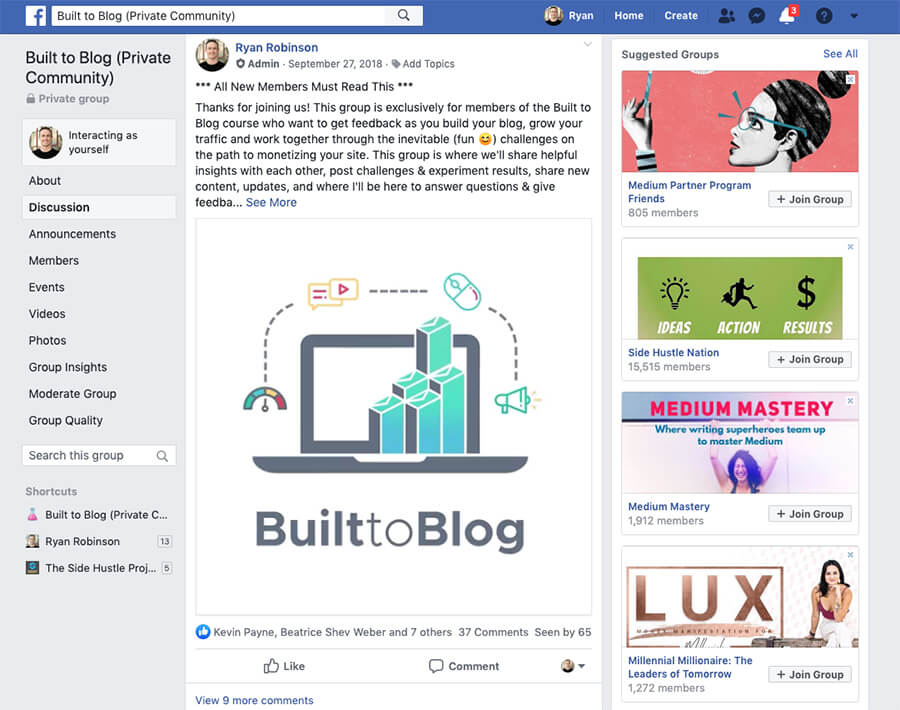
38. Blogoneer
A combination of the words “blog” and “pioneer” to describe a blogger who blogs with a pioneering (expert) attitude.
39. Blogorrhea
A portmanteau of the words “blog” and “logorrhea,” which means being excessively talkative within your blog content.
40. Blogroll
A list of other recommended blogs that are found on the sidebar or footer of a blog.
41. Blogsite
Unlike Blog Site, a blogsite is a website that showcases various blog feeds from a variety of different sources.
42. Blogsnob
A blogger who doesn’t reply to the comments that have been left on their blog.
43. Blogstipation
Similar to writer’s block, this simply means being in a state of mind that makes it difficult to think about fresh blog post ideas to write about.
44. Blogstorm
Also known as a blog swarm, this occurs when there’s a huge amount of activity surrounding a particular blog subject. Also known as the avalanche of engagement created after posting a blog on a controversial subject.

45. Boreblogging
Writing in-depth about your personal matters. It doesn’t need to be boring though 😉
46. Blogstream
Following the mainstream news and media coverage.
47. Bloll
A combination of “blog” and “troll.” A troll who specializes in trolling bloggers.
48. Bots
Automated accounts that are often used on blogs to leave spam comments (and get backlinks from those comments).
49. Bot Account
A social media account (often on platforms like Twitter or Instagram) that’s set up by an automated process and not a real person—to falsely boost follower count or the number of engagements your posts get.
50. Bounce Rate
According to Google, a bounce is a single-page session on your website. In other words, it is the percentage of people who viewed one page before leaving your blog. The bounce rate is a web analytics measure that tracks the behavior of visitors on a website or a page within a website. The bounce rate is one of the most important metrics you can keep an eye on in Google Analytics because it indicates how engaged your readers are.
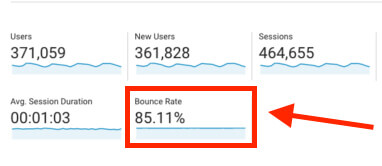
51. Backlink
A backlink is a link from another website that points to a post (or page) on your blog. A backlink usually takes you from one website to another with information related to the topic you were reading about—or at the very least, related to the hyperlink’s anchor text.
52. Beta Reader
An early test reader of your blog who gives you feedback on the quality of your content.
53. Black Hat SEO
Frowned upon, discouraged, or even illegal search engine optimization tactics used to gain SEO benefits and increase your blog’s rankings in organic search positions.
C — Blogging Terms
Alright, now blogging terms that begin with the letter C.
54. Call to Action
Also known as a CTA, that’s put in place by a blogger that wants to prompt readers into taking specific action (that’s ideally relevant to the topic at hand).
For example, here’s a relevant CTA to head over and read my free guide to starting a blog:
Want to Start Your Blog (the Right Way)?
Check out my ultimate guide How to Start a Blog (on the Side).
An even more sophisticated version of the call to action is a QR code—here are my picks for the best QR code generators to try today.
55. Category
Bloggers use a category or label tag to post based on a specific topic or niche on their blog.
56. Click Bait
Sensational or even misleading headlines that are designed to trick readers into thinking the content contains information that it doesn’t. Usually done to make the content highly shareable. Think Buzzfeed headlines.
57. Click-Through Rate
Also known as CTR, this measures the percentage of people who click on an ad or promotion to arrive at your blog. It’s a term most often used to measure the success of an online advertising campaign. The CTR can be used to gauge how well keywords in your ad campaigns are performing. Having a high clickthrough rate does not assure a good conversion rate. CTR depends on various factors, such as channel (search, display, email), industry (B2B, tech), creative type (banners, text), and targeting (broad vs. precise).
58. CAPTCHA
Short for ‘Completely Automated Public Turing Test To Tell Computers and Humans Apart,’ this is a challenge-response test that’s commonly used by bloggers and on websites of all kinds to determine if a user who wants to access information is a human or a bot—and these are particularly useful for eCommerce website builders to verify transaction data.

59. Content Marketing
Creating high-quality content that’s designed to attract readers who could potentially become a customer of your business. Content marketing is often used to support your sales funnel to answer key questions & objections, educate prospects, eliminate doubts, and provide genuine value to build meaningful relationships with your potential customers. Check out my guide to developing a smart content marketing strategy here.
60. Content Syndication
Syndication is the practice of having your blog content posted on another site after it’s been first published on your own blog. Content syndication can take the form of a simple link, thumbnail, snippet, or even a run of your entire blog post (with a link back to your original article on your blog).
61. Content Upgrade
An incentive is given to blog readers in exchange for signing up to join your email list. Content upgrades are directly related to the topic discussed in a particular article and usually take the form of a free course, template, worksheet, or other downloadable asset that furthers the education on the topic at hand.
For example, the content upgrade I promote in both my guides about how to write a blog post and how to outline a blog post is my copy/paste blog post template for starting out your own winning blog writing process:
62. Conversion Rate
The percentage of visitors on your blog who converted into completing a particular success metric. An example of a conversion rate could be the percentage of readers who joined your email list after reading a particular blog post—or the effectiveness of your blogger outreach campaign (to lead to new guest blogging opportunities, partnerships, or otherwise).
63. Creative Commons
The permission that’s given by photo-sharing sites like Unsplash, Pexels, and Shutterstock for the use of their photos.
64. Curated Content
Content that’s been hand-picked.
65. cPanel
A tool offered by all of the best hosting plans and providers that makes it easier for users to configure the technical settings of their own accounts without needing technical support.
66. Celeblog
A blog that details the lives of celebrities. Similar to a tabloid mag, these blogs often feature embarrassing photos of celebrities taken by the paparazzi.

67. Clix
A blogger’s personal circle of online communities.
68. Collaborative blog
Also called a group blog, where multiple bloggers post their thoughts on a particular issue on a single blog.
69. Comment spam
When spambots flood a blog post with fake comments.
70. Comped
Something that’s been given for free to a blogger, usually in exchange for a review (like my Bluehost reviews compilation, for example) or shoutout on social media.
71. Cost Per Click
Also known as CPC, this is a measurement of how much you spend for each click an advertisement of yours receives on an ad platform like Google or Facebook.
72. Cost Per Mille (Mille = Thousand)
Also known as CPM, this is the amount of money you spend for each block of 1,000 impressions one of your advertisements receives on an ad platform.
D — Blogging Terms
Now, blogging terms that begin with the letter D.
73. Direct Traffic
The number of people who enter your blog’s URL (address) directly into the search bar, navigating straight to your blog.
74. Domain Name
The web address of your blog (like yourawesomeblog.com) that people type into either the address bar or a Google search to find a particular website or article. It’s best to name your blog in a clever way that gives a clue as to what your content topics will cover. If you’re still trying to choose a domain name that’s ideal for your niche, try using one of these top domain name generators or head over to SmartWP’s Name Generator to give it a quick spin.
75. Domain Authority (or Domain Rating)
A metric used by SEO tools like Ahrefs and Moz to measure the authoritativeness of your blog on a scale of 0 to 100. The score of your blog arguably indicates how well your content should rank in the search engine results.
76. Dark Blog
A blog that is not accessible to the general public.
77. Desktop Blogging Client
A blog management tool that can be used offline to edit and post your blog content.
78. Dashboard
The home base area behind-the-scenes of your blog within your CMS (like WordPress or another similar platform) where you can navigate around to doing tasks like uploading blog content, installing plugins, making visual changes to your pages, and otherwise.
79. Deep Linking
Blogs that link to various other relevant pages on a blog post or website to encourage readers to spend more time on your blog.
E — Blogging Terms
Up next are blogging terms that begin with the letter E.
80. eBook
Also known as a digital book, an eBook is a book you’ve written that can be consumed in a digital format (like a downloadable PDF or on the Amazon Kindle store). Check out my guide about how to write an eBook (and monetize your audience with it) for much more on eBooks.
81. Engagement
The number of comments, likes, or retweets your blog posts can generate.
82. Editorial Calendar
This is a smart blogging tool that’s used by many bloggers (like me) to sketch a blog post outline and fully explain the blog post ideas I’ll be writing about in the future. It also helps me organize my writing process and track content performance over time. Editorial calendars are usually maintained on a monthly or quarterly basis.
83. Event Blogging
Blogging on upcoming events for which bloggers and marketers also often purchase EMDs (Exact Match Domains) for those upcoming events.

84. Evergreen Content
Evergreen content refers to blog posts or other digital content that’s usually very thorough & in-depth, written to remain relevant for years to come.
F — Blogging Terms
On to the next! Blogging terms that begin with the letter F.
85. Followers
Those who subscribe to your blog or follow your accounts on social media platforms like Twitter or Instagram.
86. Follow/Unfollow
The trick of following social media accounts to entice them into following your account back—only for you to soon unfollow the ones that didn’t follow you back, thus boosting your follower count and making it appear that you have more engagement than you actually do.
87. Fisking
A point-by-point refutation of a blog entry that’s often witty and sarcastic.
88. Flog
A mashup of the words “fake” and “blog.” Most often used to describe either an entire blog or article that’s been ghostwritten by someone other than the claimed author.
89. Favicon
The image displayed for a website within your browser tab.

90. Flame War
Attacks or personal arguments are made in a blog’s comment section. These can get nasty quickly.
91. Farticle
Get your head out of the gutter. This term is slang to describe a fake news article or an advertorial that’s positioned to look at an unbiased news story or product review.
92. FTP
Stands for File Transfer Protocol, which is a client-server protocol used for the transfer of files. This is a popular way of downloading or uploading files from or onto a server.
G — Blogging Terms
Up next, we’ve got the key blogging terms that start with the letter G.
93. Gravatar
The image that follows you from blog to blog (usually when you post a comment or write a guest blog post), appearing beside your name. You can set up your Gravatar here.
94. Guest Post
Guest blogging is when you write a blog post or article for another person’s blog to attract some of their readers back to your own blog (and to increase the authority of your website in the eyes of search engines).
95. Glog
A mashup of the words “gonzo” and “blog,” which is a first-person recording of a particular activity.
96. GBCW
Good Bye, Cruel World. This term is often used by someone who decides to discontinue their blog. Avoid these blogging mistakes, and you’ll steer clear of needing to GBCW your blog anytime soon.
97. Gulog
A distasteful combination of the words “gulag” and “blog” that’s often used to describe a depressing blog post.
H — Blogging Terms
98. H1, H2, H3 Tags
Heading tags that denote different size headings in a blog post or on a particular page. The H1 tag should contain your main keyword phrase and should only be used once on a page. The H2 tag is a subheading and should contain keywords similar to the H1 tag but can be used to break up major sections of your content.
The H3 tag is the subheading of the H2 tag and should be used to denote content sections within your larger H2 sections. When it comes to Heading tags, H1 is the most important, while H3 (and so on) gets less and less attention from search engines.

99. Hosting Service
The company that hosts your blog online and makes it visible on the Internet. Here are my recommendations for the best monthly hosting plans you should consider—and if you’re on a tighter budget, consider these cheap hosting plans or opt for experimenting with a free hosting plan instead.
100. HEX Code
Short for hexadecimal. This term is used to denote a specific color code for HTML coding. For example, the HEX code for this red is #eb4034. If you’re looking for a color picker, too, Google has their own HEX color picker right here.
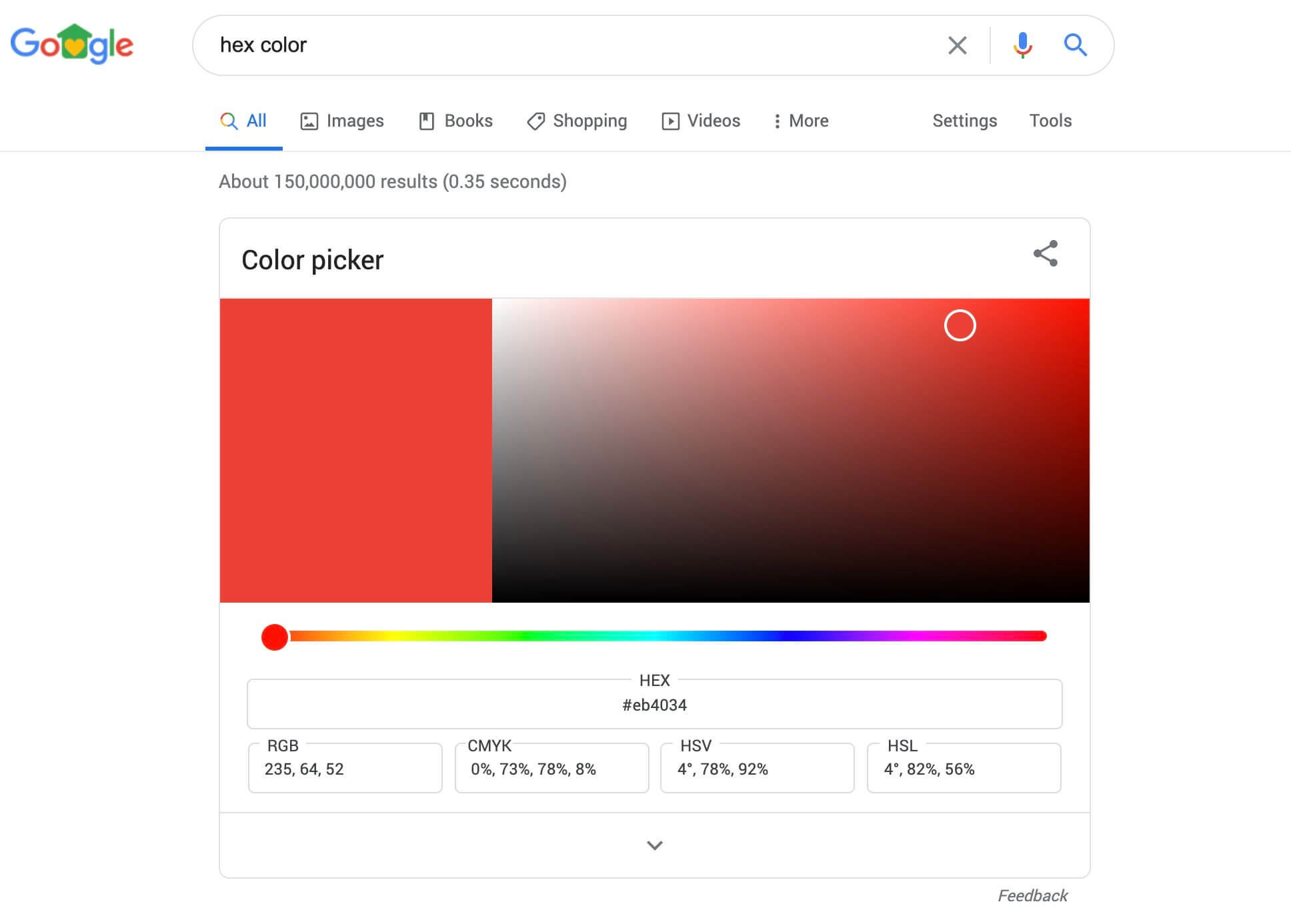
101. Hyperlink
A link (usually a text link) from one blog that directs readers to another website.
102. HARO
A service called Help A Reporter Out that’s used to connect online publishers and journalists with experts who can answer questions and contribute to their articles.
103. Hits
The number of users that visit (hit) your blog within a given period.
104. HT
An acronym for “heard through” or “hat tip” that serves as an acknowledgment to the source by a blogger who found something noteworthy.
105. Hyper-Local
Content that relates to a small audience or community.
I — Blogging Terms
Now, blogging terms that begin with the letter I.
106. Influencer
An influencer is someone with a large following who marketers and brands can partner with to promote their business. Many bloggers aim to build up a sizable following and be considered influencers, which is one proven way to make money blogging.
107. IRL
It stands for “In Real Life” and is used by bloggers to talk about their lives when they’re not blogging.
108. Internal Link
A link that connects a snippet of text within one blog post to your other blog posts on the same site. Internal links are used to send readers over to relevant other articles and to more clearly connect your content for SEO benefits.
109. Infographic
A graphic visual that’s used to break down complex information into easy-to-digest visual content. Check out my infographics about how to start a blog and how to write a blog post.
110. Internet Water Army
A group of ghostwriters, also called “paid posters,” are paid to post comments on particular content with the purpose of spreading disinformation. (Mostly a term used in China).
111. Internet Activism
The use of social media, email, blogs and podcasts for various forms of activism.
K — Blogging Terms
Now, blogging terms that start with the letter K.
112. Keyword
A targeted word that’s used to best describe the contents of a blog post or website. Doing intelligent keyword research and incorporating your target keywords in your content is important to creating successful blog posts because it gives Google clear information about the nature of your article. Without proper keywords, Google won’t know how to index your articles, making it harder for your blog to rank in organic search results.

113. Keyword Research
Keyword research is the process of (ideally) finding untapped, high-volume keywords that your readers search for on Google. A clever keyword research strategy is to target keywords within your blog’s competitive power—the maximum keyword competition your site is likely to rank for. You can increase your chances of finding the best keywords by using a combination of various tools like my very own Free Keyword Research Tool, Google Keyword Planner, Ahrefs Keywords Explorer, Twinword Ideas or Moz Keyword Explorer.
114. Keyword Stuffing
The act of placing too many of the same keywords within a single post or page—in an attempt to game search engines and rank higher. (Don’t do it).
115. Koufax
An annual quasi-Liberal weblog award.
116. K-log
Knowledge log posted on the company intranet for sharing of company knowledge.
L — Blogging Terms
Up next, blogging terms that start with the letter L.
117. Link Bait
Content that’s created in order to gain attention so that other blogs or publications want to link to and share the content.
118. Link Exchange
Whenever two (or more) bloggers place a link to each other’s blog post (or homepage) in order to increase their number of inbound links. Beware, though, this practice is expressly discouraged by Google as a link scheme, and I highly recommend not doing it, as this qualifies as black-hat (shady) SEO.
119. Listicle
A term used to describe a list-based blog post that takes the form of a piece like this one you’re reading right now… “230+ Blogging Terms Your Need to Know This Year.”
120. Lazy Web
A suggestion sent out to a community to get someone else to do the work.
121. Link Love
Linking to a blog you like because it regularly posts useful information.
122. Log in, Blog To, Log Out
This is a catchphrase that’s used to describe the blogger’s lifestyle.
123. Linkroll
A list of relevant links with brief descriptions in the sidebar of a blog.
124. LBloggers
A commonly used hashtag for Lifestyle Bloggers.
125. Lead Magnet
An incentive that’s offered by a blogger, in order to encourage readers to subscribe and join their email list. It’s synonymous with the blogging term content upgrade, which we covered earlier.
126. Link Building
Artificially increasing your SEO authority by getting other content creators to link to your blog or individual articles. Also considered a link scheme by Google, I recommend steering clear and focusing much more on creating high-quality content that can better serve readers than the competition.
127. Link Party
Where bloggers go to show their blog posts in an online forum by leaving links to their content.
128. Long-Form Content
Any blog post that has a longer word count than 1,000 words. I’m a major advocate of using long-form content to attract (and retain) readers, so take a look at my best content to see how I execute a long-form content strategy.
129. Long-Tail Keywords
Long-tail keywords are phrases usually comprised of 3, 4, or more words and are very specific to a narrow topic. These keywords are beneficial to blogs because they’re usually much less competitive to rank for, and you’ll also be bringing highly targeted readers to your blog—albeit a lower volume of them.
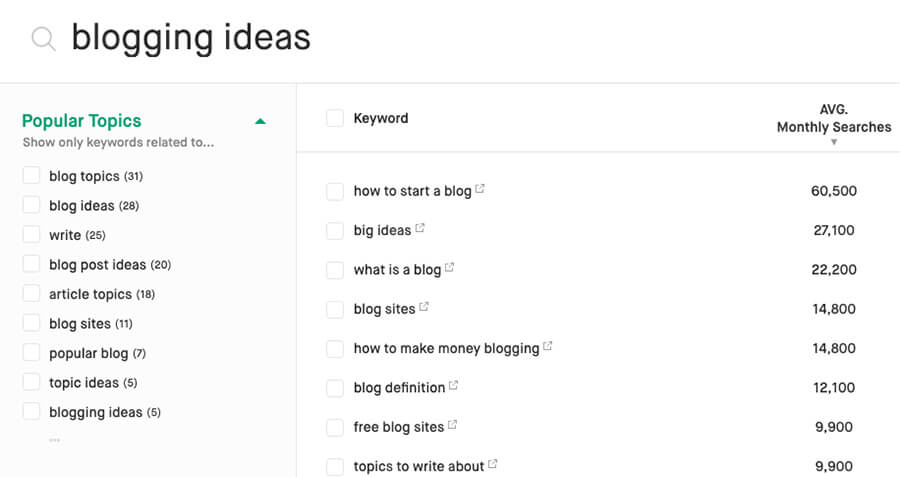
130. Litblog
Any blog post that focuses specifically on literature.
M — Blogging Terms
Blogging terms that begin with the letter M.
131. Media Kit
A media kit contains relevant statistics about your blog & audience that can be used to pitch potential sponsors on why they should pay to reach your audience.
132. Meta Description
The description (HTML tag) that’s used to describe the content of a blog post or page to search engines. See here:

133. Microblog
Where the blogger makes frequent short posts.
134. Monetization
The ways in which bloggers decide to make money blogging. There are several ways in which you can monetize your blog including through affiliate programs, advertising networks, sponsorships, the sale of digital products, physical products, offering your services and more.
135. Milblog
A combination of the words “military” and “blog” used to describe blogs that members have written of any branch of the military (Army, Navy, Air Force, Marines, etc).
136. Moblog
A blend of the words “mobile” and “blog” featuring blog posts that are sent mainly by mobile phone via text messages. Trust me, I know the English language is unique 😂
137. Momosphere
A term used to describe blogs that mothers write.
138. Multi-blog
Creating and maintaining multiple blogs at a time.
139. Multi-blogger
A blogger that has multiple blogs running simultaneously.
140. Mobile-Optimized
A blog that’s been tweaked to be viewed on handheld devices with a great user experience. If you choose the right WordPress theme to power your blog, it’ll come mobile-optimized (responsive) out of the box.
N — Blogging Terms
Up next, blogging terms that begin with the letter N.
141. Niche
A blog niche is the specific category of topics you’ve decided to blog about within a particular industry.
142. Natural Blogarithm
A combination of the words “natural logarithm” and “blog” used to describe the vibe of the blogging community.
143. Newsletter
An email-based delivery of content that’s sent out periodically to the subscribers of a blog. You can read more about how to build your email newsletter in my top (free) blogging books.
O — Blogging Terms
Now, blogging terms that start with the letter O.
144. Organic Growth
An overall increase of blog traffic that occurs over time as you work to publish quality content, spread the word and bring more readers into your community.
145. Organic Search Results (OSR)
The blog posts on your site that reach rankings for their respective keyword phrases on Google’s search engine result pages.
146. Off-Page/On-Page SEO
Search Engine Optimization that’s done to generate more awareness for your blog. Off-page SEO focused on promoting your content through activities like sharing on social media, while on-page SEO is all about optimizing the individual posts & pages of your blog to be friendly in the eyes of search engines.
147. Opt-in
An incentive (like a content upgrade or lead magnet) that’s offered to readers who opt-in to receiving email updates about your blog.
P — Blogging Terms
Alright, here are the key blogging terms that begin with the letter P.
148. Page
A static page on a blog or website that does not update automatically. Pages are different than blog posts in that they’re not added to your RSS feed when a new one is published.
149. Page Rank
Google’s algorithm used to measure the authority of a blog post or particular website in general.
150. Page Views
The number of people who view a particular blog post in a given timeframe.
151. Pain Point
The specific problems faced by readers, that can ideally be solved by the blogger.
152. Parent Theme
The overarching WordPress theme used to control the visual look of your blog.
153. PPC
Pay Per Click is a form of advertising where bloggers pay for each click their advertisement receives.
154. Permalink
The unique URL of the blog post that you publish. Permalinks should rarely ever be changed.
155. Plugin
Plugins are software snippets that add more functions or features to your blog—most commonly offered by private developers who make plugins for WordPress.
156. Padding
The putting together of several mini blog posts to get your blog ready to roll out.
157. PENUS
Cool it. This term stands for ‘Potentially Exciting News Under Scrutiny’ which is used when a blogger needs to share something cool and informative with the blogosphere.

158. Photoblog
A blog that contains mostly photos and images, usually run by a photographer.
159. Placeblog
Used with a hyper-local scope to focus on local people and events.
160. Plog
A blog that regularly posts about political subject matter.
161. Pillar Content
Content that’s created to be extremely informative, usually long-form, and has long-term appeal to readers. My ultimate guide about how to start a blog is a great example of this.
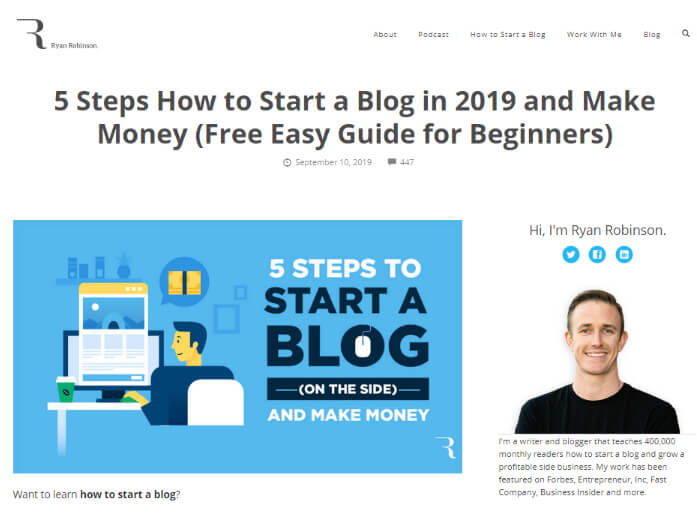
R — Blogging Terms
Up next, blogging terms that begin with the letter R.
162. Reciprocal Link
A link between two different blogs. If done between blogs that you own, this tends to be a safe practice. However, if you’re doing it with the goal of inflating your own blog’s SEO rankings, then it’s considered a link scheme that you should not take part in.
163. Referral Traffic
The readers who visit your blog after following a link to your content from another blog or website.
164. Rich Answer
Google’s quick result answers to your search engine queries.
165. ROI (Return on Investment)
Your return on investment based on the money you’ve spend on a particular ad campaign within a given window of time.
166. RSS Feed
Short for ‘Really Simple Syndication’ is used by some people to subscribe to a blog. This method of blog subscription used to be more popular, though. In an RSS feed, all your favorite online content is curated and gathered in a single place for you to view.
167. RSS Aggregator
Software that a blogger uses to read their RSS feeds, also known as a feedreader.

168. Re-Blog
The reposting of a previous blog, usually with updated and refreshed information, to make it more relevant.
169. Reverse Blogging
This is when you pitch an influencer to create content for your blog, which you ultimately publish under the influencer’s name as a guest post.
170. Rel=Canonical
The rel=canonical tag, also known as “canonical link,” is an HTML element that helps webmasters prevent duplicate content.
S — Blogging Terms
Now, we’ve got blogging terms that start with the letter S.
171. Split Testing
Synonymous with A/B testing, a split test is done to see which version of a headline, page, or other specific page element better converts more of your readers.

172. SERP
Short for Search Engine Results Page, which is usually referenced in the context of how your blog is performing in organic search results.
173. Sponsored Post
A blog post that’s been paid for by advertisers or brands to promote their product or service.
174. Subscriber
A person who’s signed up for your email newsletter and wants to be updated when a new blog post is published.
175. Scribosphere
A mashup of the words “scribe” and blogosphere” used to describe all blogs that are written by professional and aspiring screenwriters.
176. SHART
Again, not what you’re probably thinking… This is an acronym of ‘Stubborn, Hostile and Resentful Troll’. A blog that receives many negative comments from a specific troll is said to be sharted. Also refers to bloggers who post fake comments on their own blog to gain sympathy.

177. Shocklog
A blog that posts shocking content to encourage heated discussions on a particular subject.
178. Splog
The term used to describe a spam blog, made popular by Mark Cuban.
179. Spam Blog Post
An individual blog post that’s composed of spam content or used solely to promote shady products.
180. Slashdotted
When larger websites send a tremendous amount of traffic towards smaller blogs via linking to their content. (This is a good thing 🙂)
181. Storyblog
A blog that’s used primarily as a destination to publish short stories.
182. Svithe
A spiritually themed blog.
183. SAHM
Shorthand acronym for Stay at Home Mom.
184. Self-Hosted blog
When the blogger owns both their blog content and their domain name. My self-hosted blog is powered on WordPress, and if you choose to start a blog (the right way), you’ll end up with a self-hosted blog. The trade-off is that you’ll need to pay for your own hosting plan in order to keep your blog live on the Internet—but there are also free blogging platforms available if you want to test out blogging.
185. Semantic Search
Search terms that are used to understand user intent.
186. SEO (Search Engine Optimization)
SEO stands for Search Engine Optimization, which is a process used to improve your blog’s rankings in search engine result pages.
187. Sitemap
A list of the pages on your entire blog. Specifically used by Googlebot, a sitemap (XML sitemap) is a file that is not visible to the readers of your blog unless specifically searched for. It’s used by Googlebot to crawl the pages of your blog and determine what should be included in their search results.

188. Skyscraper Technique
The skyscraper technique is a tactic used by bloggers to analyze all the existing content for a particular keyword phrase and then come up with more creative and useful ways to better answer those reader queries with significantly more valuable content.
189. Stop Words
Words that are used in the slug that can harm your SEO-effectiveness. Some stop words to avoid including in your permalinks include: a, the, at, as, of, and, for, to and so on.
190. Slug
The portion of a permalink (URL) starting after .com/.
191. Social Media Engagement
Engaging with your target readers on the social media platforms they frequent.
192. Social Proof
A psychological phenomenon where people assume that a blog post is more popular (or more accurate) based on the number of social shares, comments, or other engagement the article appears to have.
193. Social Search
When people search for information on social platforms (like Twitter, Instagram, Facebook and LinkedIn) that mainly searches for user-generated content to find information.
194. Spam
Most commonly referred to when speaking about spam emails that arrive, often promoting scam offers.
195. Sockpuppet
An online identity created for deception. Also used to circumvent a block or ban on an individual’s original email or social media account.
T — Blogging Terms
Next, blogging terms that start with the letter T.
196. Tag
Tags are words that are used to categorize & classify a blog post based on the overarching themes it covers behind the scenes in your CMS.
197. Tagline
The slogan used by blog owners to describe the purpose of their site. My tagline is Authentic blogging advice.
198. Tag Cloud
Used by bloggers to list all of the tags and keywords that have been used across their sites.
199. Text Link Ads
Advertisements consisting of text that is hyperlinked to a page the sponsor is paying you to promote.
200. Traffic
The number of visitors a blog receives within a given time period. Here’s my guide on how to drive traffic to your blog.
201. Troll
Someone who leaves negative comments on your blog post just for fun or to incite a reaction out of you
202. Template (WordPress)
A page template is the coding framework that’s used to organize and publish information on a page of your blog, which greatly determines your overall visual blog layout.
203. Theme (WordPress)
The WordPress theme comprises the CSS code that controls the visual appearance of your blog.

204. Trackback
A system that’s used by bloggers to be notified by (or send notifications to) others who have either linked to their blogs.
205. Target Reader
The target reader, or target audience, describes the demographic and psychographic beliefs of who a blogger wants to attract with the content they create.
206. Tailwind
A tool that bloggers use to schedule their Pinterest and Instagram posts.
207. Thin Content
A blog post or page that offers no real value in terms of information and relevancy has little chance of ever ranking in organic search results.
U — Blogging Terms
Next up, blogging terms that begin with the letter U.
208. Unique Visitor
An individual, single visitor of your blog (who may have multiple sessions or could view many pages in one session).
209. User Intent
The goal of a searcher when typing in a particular set of keywords or search queries.
210. UGC
An acronym for User Generated Content, used to describe the content that’s created by visitors of a blog (like comments, guest articles, forum posts or other contributions).
V — Blogging Terms
Now, blogging terms beginning with the letter V.
211. Viral
Content like videos, memes, or blog posts becomes extremely popular in a very short timeframe, but this fame is often short-lived.

212. Vlog
A video blog that publishes content primarily in video format.
213. Vlogger
Somebody who manages a video blog (and often a YouTube channel).
214. Virtual Assistance (VA)
A virtual assistant is someone who (often) helps bloggers with administrative tasks, usually remotely.
215. Vorage
Like foraging, this is when bloggers share interesting video content online by voraging through new and obscure websites.
W — Blogging Terms
Now, blogging terms starting with the letter W.
216. WAHM
Short for Work at Home Mom, which makes up a lot of the blogging community.
217. Webinar
Typically a live video seminar or workshop that’s conducted online using tools like Zoom or Google Hangouts. If these two platforms aren’t your thing, be sure to check out the best alternatives to Zoom on the market today.
218. White Hat SEO
Search Engine Optimization strategies that are legal, encouraged, and not penalized by Google.
219. Widgets
Blogging tools that are provided out of the box by WordPress and can add functionality to the sidebar, header, or footer menu of your blog.
220. WYSIWYG
Short for What You See Is What You Get. Most great WordPress themes today function this way, which allows bloggers to post new content and publish pages without writing any code, known as posting in WYSIWYG mode.
221. Web Keynoting
To have the text in a blog post dictated by a voice professional.
222. Weborexic
A term used to describe small ‘width-wise’ layouts of a blog.
223. WordPress
A free blogging platform that allows users to create their own customized blogs and websites for free. It’s the leading platform used by the vast majority of bloggers around the world.
224. Warblog
A blog that is devoted to covering news about ongoing wars.
225. Weblog
The long-form name that preceded the term blog (check out the history of blogging for more).
226. Web Server
A web server is a program that uses HTTP (Hypertext Transfer Protocol) to serve the files that form web pages. A web server can contain one or more websites, and it’s what keeps your blog online.
227. Word Banning
A feature (offered by TypePad, another blogging service) used by bloggers to ban certain words from being displayed in their blog content or comment section.
X — Blogging Terms
Almost there! Blogging terms beginning with the letter X.
228. XML
XML or Extensible Markup Language is extremely useful in describing, sharing and transmitting technical data about your blog across the Internet. Not to be confused with Schema Markup data that’s now commonly used to communicate key information about your blog directly to search engines.
229. XHTML
Extensible HyperText Markup Language is the successor to HTML on which all web pages are now created today.
Y — Blogging Terms
Just one blogging term that starts with the letter Y.
230. Yoast
A popular WordPress plugin used by bloggers to improve their SEO. The plugin has become an essential tool in the blogger’s arsenal because of its ability to simplify SEO, set up great titles, write good meta descriptions and more.

Z — Blogging Terms
Last but not least, our final blogging term that starts with the letter Z.
231. Zombie blog
A blog that’s considered spam.
Final Thoughts on Blogging Terms (Glossary) to Know
It can take years to fully master all of the blogging terms, shorthand, abbreviations, and jargon out there in the world.
Don’t put undue pressure on yourself to memorize these, either. Bookmark this glossary of blogging terms to come back to any time you’ve got a question about a term that doesn’t sound familiar to you. And if you want to learn more about growing a blog, check out these resources I’m frequently updating:
- How to Promote Your Blog (and Get More Readers)
- How to Create a Blog Business Plan
- How Much Does it Cost to Start a Blog?
- 40 Blogging Tips from the World’s Top Bloggers
Now that we’ve made it through all of the key blogging terms you’ll need to know—head over to my ultimate guide to starting a blog and keep your progress going.
Want to Start Your Blog (the Right Way)?
Check out my ultimate guide How to Start a Blog (on the Side).


This was super helpful, thank you for sharing!
👍
this is great!
Thanks, Tyler! Hope you found some fun new terms here 🙂
Awesome guide, you’re one of the best bloggers that publishes long and interesting content
Thanks for the kind words, Akinduyo 🙂
Hello Ryan.
I hope one day i will meet up with you.
I am recently started my blog about niche course sell about blog issue and SEO strategy.
Nice! Keep up the work, Mizankur and I’m sure we’ll cross paths at some point at a blogging conference 🙏
Thanks for sharing, That a really hard work putting all this together. I think this will be helpful when I finally start my blog.
Woo! Awesome to hear, Ajibola 🙂
Hello Ryan.
Strategies are very nice for blog/content marketing. Lots of people come to this line with lots of expectation but the crisis of proper guidance they can’t go far away but this article is different than others. Hope this will work for me as well.
Thanks.
Agreed! Hope this helps boost your blogging vocabulary too 💪
This is a really great list of terms.
Thank you for sharing such useful information.
You’re welcome, Oscar! 🙂
Great and inspiring list of helpful blogging terms, I signed up for your next update!
Woo! I’m honored to have you here, Robert. Stay tuned for more content weekly 🙂
Wow, I’m really amazed by the list of terms you put up.
this list will help every newbie blogger understand the terms they need to know as a blogger.
Thanks for stopping by, Tarun!
I found your blog on google and loved reading it greatly. This is a great post, so many helpful terms. Thanks.
The info was great. But this statement doesn’t sound truthful –
“31.7 million bloggers by the end of 2020 (in the US alone). ”
If you think about it, 3 million sounds more realistic.
Hey Patrick! That’s a lot of people, I know—it kind of blew my mind at first too.
Did you by chance click through to my article that breaks down a ton of relevant blogging statistics (including the 31.7 million bloggers in the U.S. by 2020 figure)? Right here: https://www.ryrob.com/blogging-statistics/
You’ll see that stat is backed up by data/research from Statista… here’s a screenshot of that graph: https://www.ryrob.com/wp-content/uploads/2020/04/Statista-Number-of-Bloggers-in-the-US-2020.png
Thanks for this article! It helped me piece together a lot of terms I’ve been hearing and it offered some much needed humor. Blogging is hard and this made it a little easier- so thanks!
Ah, you’re so welcome Becky! Glad to provide a quick laugh to your day in these times 🙂
nice and useful article. thank u. i am sharing this article in my blog
Thanks, Raju!
Perfect post. This is very valuable information.
Glad to hear it! 🙂
You are a smart blogger. This article is very helpful for many of us. A strong blogging glossary and their definitions are a need to know for everyone in blogging.
Thank for sharing a great article.
Thank you, Abek! Good luck with your blog as well.
Wonderful, lots of useful info, thanks a lot
🙏
What an amazing blog… hope it will be enough to get more positive result and looks like a good starting point!
Thanks for the praise! Good luck with your blog as well
Hi thank you for all your information with nice flow. I will look forward to next part of the tutorials!!
Glad to hear it! 🙂
You’ve written several posts, promoted your blog, and taken all of the necessary steps to ensure its success, yet your site still receives less than 100 page views each month. Are you wondering if you’re doing something wrong? Is blogging still alive?
No! Blogging is not extinct. As more individuals explore the internet every second, the style of blogging is evolving to keep the reader’s attention. Blogging has evolved into something other than a personal diary. Instead, focus on the information you can provide to your target audience.
🙌
This content was helpful with blogging terms with tips ,thank you for sharing useful article
You’re welcome! 🙂